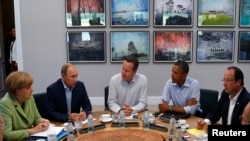NORTHERN IRELAND —
International efforts to end the violence in Syria have dominated both days of the Group of Eight summit in Northern Ireland. Russian President Vladimir Putin clashed with the other G8 leaders over his support for the government of Syrian President Bashar al-Assad.
The summit's working dinner late Monday turned contentious, as U.S. President Barack Obama and the other world leaders turned up the pressure on Putin, who said ousting Assad would lead to instability in the Middle East. The dinner followed a chilly bilateral meeting between Obama and Putin, neither of whom changed his position on the Assad government.
The U.S. and Russia do agree on the need for talks in Geneva to end the bloodshed in Syria, and the eight leaders spent much of Tuesday working toward an agreement on such a conference.
The meetings at a Northern Ireland golf resort have highlighted differences between Russia and the West on chemical weapons, which the United States alleges Syria is using, and on Obama's decision to send military aid to the Syrian opposition.
On the PBS interview program Charlie Rose, the president said U.S. backing for the Syrian rebels could help advance peace talks.
"We've been assisting not only the political opposition, but also the military opposition so that there's a counterweight that can potentially lead to political negotiations, with the evidence of chemical weapons what we've said is we're going to ramp up that assistance," said Obama.
The White House also announced more than $300 million in additional US humanitarian aid for people affected by the conflict in Syria. The U.S. estimates that 1.6 million refugees have fled the country.
The second and final day of the summit also focused on economic issues. The G8 leaders agreed on a plan to increase the transparency of corporate ownership and control. It is designed to fight money laundering, tax havens, shell companies and front companies that are used to evade tax payments.
From Northern Ireland, the president moves on to Berlin. In the German capital, Obama will speak before a large crowd at the historic Brandenburg Gate. Before the trip, the president's Deputy National Security Adviser, Ben Rhodes, said the speech will have special significance, 50 years after President John F. Kennedy's famous "Ich bin ein Berliner" address.
"It is the eastern side of the gate that the president will be speaking on, something that would have been impossible 50 years ago, but given the progress that's been made in Germany, and given the fall of the Berlin Wall and the reunification of the country, it’s a true symbol of the partnership that we've forged together," said Rhodes.
The president will also meet with German Chancellor Angela Merkel, who is likely to express her concern about the extent of U.S. surveillance on American and allied citizens.
The summit's working dinner late Monday turned contentious, as U.S. President Barack Obama and the other world leaders turned up the pressure on Putin, who said ousting Assad would lead to instability in the Middle East. The dinner followed a chilly bilateral meeting between Obama and Putin, neither of whom changed his position on the Assad government.
The U.S. and Russia do agree on the need for talks in Geneva to end the bloodshed in Syria, and the eight leaders spent much of Tuesday working toward an agreement on such a conference.
The meetings at a Northern Ireland golf resort have highlighted differences between Russia and the West on chemical weapons, which the United States alleges Syria is using, and on Obama's decision to send military aid to the Syrian opposition.
On the PBS interview program Charlie Rose, the president said U.S. backing for the Syrian rebels could help advance peace talks.
"We've been assisting not only the political opposition, but also the military opposition so that there's a counterweight that can potentially lead to political negotiations, with the evidence of chemical weapons what we've said is we're going to ramp up that assistance," said Obama.
The White House also announced more than $300 million in additional US humanitarian aid for people affected by the conflict in Syria. The U.S. estimates that 1.6 million refugees have fled the country.
The second and final day of the summit also focused on economic issues. The G8 leaders agreed on a plan to increase the transparency of corporate ownership and control. It is designed to fight money laundering, tax havens, shell companies and front companies that are used to evade tax payments.
From Northern Ireland, the president moves on to Berlin. In the German capital, Obama will speak before a large crowd at the historic Brandenburg Gate. Before the trip, the president's Deputy National Security Adviser, Ben Rhodes, said the speech will have special significance, 50 years after President John F. Kennedy's famous "Ich bin ein Berliner" address.
"It is the eastern side of the gate that the president will be speaking on, something that would have been impossible 50 years ago, but given the progress that's been made in Germany, and given the fall of the Berlin Wall and the reunification of the country, it’s a true symbol of the partnership that we've forged together," said Rhodes.
The president will also meet with German Chancellor Angela Merkel, who is likely to express her concern about the extent of U.S. surveillance on American and allied citizens.




